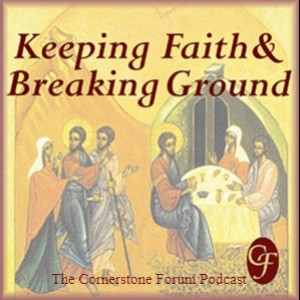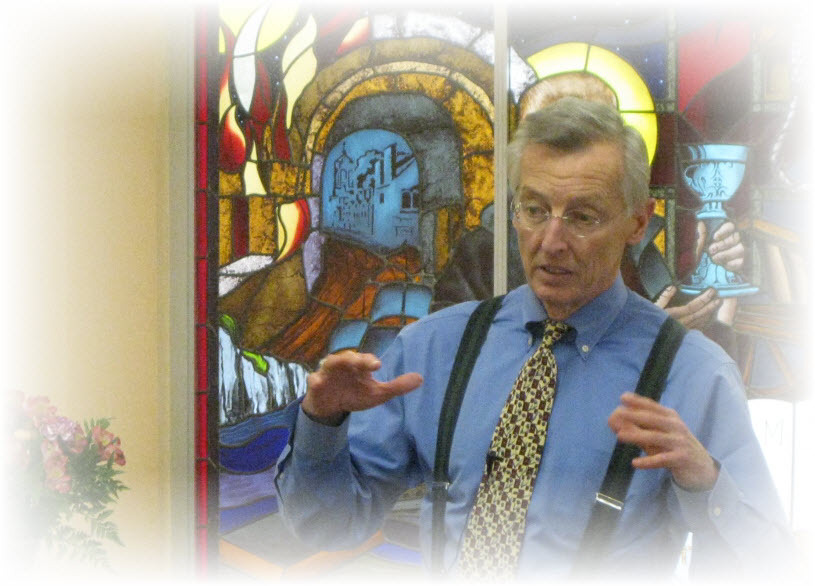Episodes

Friday Oct 29, 2021
Friday Oct 29, 2021
Gil Bailie explores elements of a sacrament as depicted in Isak Dinesen's Babette's Feast.
This was part of a series of presentations entitled Crucial Choice . The crucial choices between sacrifice and sacrament are narrated in the short stories of Isak Dinesen's Babette's Feast, and Flannery O'Connor's The Displaced Person.

Thursday Oct 28, 2021
Thursday Oct 28, 2021
This two part presentation was part of a series entitled "Crucial Choice" where Gil Bailie compared the Isak Dineson short story, Babette's Feast, and Flannery O'Connor's The Displaced Person exploring the sacramental and sacrifical movements in the stories.

Wednesday Oct 27, 2021
Wednesday Oct 27, 2021
This two part presentation was part of a series entitled "Crucial Choice" where Gil Bailie compared the Isak Dineson short story, Babette's Feast, and Flannery O'Connor's The Displaced Person exploring the sacramental and sacrifical movements in the stories.

Tuesday Oct 26, 2021
Tuesday Oct 26, 2021
Publius Vergillius Maro, 70-19 BCE, wrote his epic poem seemingly to honor the Pax Romana of Emperor Augustus. But does his poetic skill hide a truth? An undercurrent of doubt about the sustainability of the Roman enterprise haunts the poem leading to a labyrinthine dead end foreshadowed at Rome’s founding in the brutal slaying of the Rutulian king Turnus by Aeneas. Peace via the sword will be Rome’s legacy until the coming of the Prince of Peace in the dusty Galilean outback of the Augustan empire…(to be continued in the Poetry of Truth—Reflections on the Gospel of Luke.)

Monday Oct 25, 2021
Monday Oct 25, 2021
Publius Vergillius Maro, 70-19 BCE, wrote his epic poem seemingly to honor the Pax Romana of Emperor Augustus. But does his poetic skill hide a truth? An undercurrent of doubt about the sustainability of the Roman enterprise haunts the poem leading to a labyrinthine dead end foreshadowed at Rome’s founding in the brutal slaying of the Rutulian king Turnus by Aeneas. Peace via the sword will be Rome’s legacy until the coming of the Prince of Peace in the dusty Galilean outback of the Augustan empire…(to be continued in the Poetry of Truth—Reflections on the Gospel of Luke.)

Sunday Oct 24, 2021
Sunday Oct 24, 2021
Publius Vergillius Maro, 70-19 BCE, wrote his epic poem seemingly to honor the Pax Romana of Emperor Augustus. But does his poetic skill hide a truth? An undercurrent of doubt about the sustainability of the Roman enterprise haunts the poem leading to a labyrinthine dead end foreshadowed at Rome’s founding in the brutal slaying of the Rutulian king Turnus by Aeneas. Peace via the sword will be Rome’s legacy until the coming of the Prince of Peace in the dusty Galilean outback of the Augustan empire…(to be continued in the Poetry of Truth—Reflections on the Gospel of Luke.)

Saturday Oct 23, 2021
Saturday Oct 23, 2021
Publius Vergillius Maro, 70-19 BCE, wrote his epic poem seemingly to honor the Pax Romana of Emperor Augustus. But does his poetic skill hide a truth? An undercurrent of doubt about the sustainability of the Roman enterprise haunts the poem leading to a labyrinthine dead end foreshadowed at Rome’s founding in the brutal slaying of the Rutulian king Turnus by Aeneas. Peace via the sword will be Rome’s legacy until the coming of the Prince of Peace in the dusty Galilean outback of the Augustan empire…(to be continued in the Poetry of Truth—Reflections on the Gospel of Luke.)

Friday Oct 22, 2021
Friday Oct 22, 2021
Publius Vergillius Maro, 70-19 BCE, wrote his epic poem seemingly to honor the Pax Romana of Emperor Augustus. But does his poetic skill hide a truth? An undercurrent of doubt about the sustainability of the Roman enterprise haunts the poem leading to a labyrinthine dead end foreshadowed at Rome’s founding in the brutal slaying of the Rutulian king Turnus by Aeneas. Peace via the sword will be Rome’s legacy until the coming of the Prince of Peace in the dusty Galilean outback of the Augustan empire…(to be continued in the Poetry of Truth—Reflections on the Gospel of Luke.)

Thursday Oct 21, 2021
Thursday Oct 21, 2021
Publius Vergillius Maro, 70-19 BCE, wrote his epic poem seemingly to honor the Pax Romana of Emperor Augustus. But does his poetic skill hide a truth? An undercurrent of doubt about the sustainability of the Roman enterprise haunts the poem leading to a labyrinthine dead end foreshadowed at Rome’s founding in the brutal slaying of the Rutulian king Turnus by Aeneas. Peace via the sword will be Rome’s legacy until the coming of the Prince of Peace in the dusty Galilean outback of the Augustan empire…(to be continued in the Poetry of Truth—Reflections on the Gospel of Luke.)

Wednesday Oct 20, 2021
Wednesday Oct 20, 2021
Publius Vergillius Maro, 70-19 BCE, wrote his epic poem seemingly to honor the Pax Romana of Emperor Augustus. But does his poetic skill hide a truth? An undercurrent of doubt about the sustainability of the Roman enterprise haunts the poem leading to a labyrinthine dead end foreshadowed at Rome’s founding in the brutal slaying of the Rutulian king Turnus by Aeneas. Peace via the sword will be Rome’s legacy until the coming of the Prince of Peace in the dusty Galilean outback of the Augustan empire…(to be continued in the Poetry of Truth—Reflections on the Gospel of Luke.)

Keeping Faith & Breaking Ground
Without Christianity neither the nature of the present crisis of culture nor the meaning of history itself can be properly comprehended. If the Christian revelation is to come to our aid in this moment of peril, we must learn to account for its sweeping claims in ways that are faithful to Church teachings, intellectually cogent, morally rigorous, charitable, anthropologically sound, and undeterred by the moribund spirit of our age.



